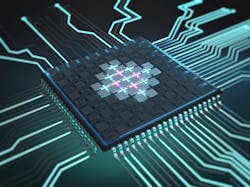Military researchers focus on underexplored solutions to build quantum computer to help solve difficult problems
ARLINGTON, Va. – U.S. military researchers are asking industry to determine if it's possible to build a quantum computer that has a value that exceeds its costs -- particularly for applications that require fault-tolerance.
Officials of the U.S. Defense Advanced Research Projects Agency (DARPA) in Arlington, Va., issued a solicitation on Friday (DARPA-PS-22-04) for the Underexplored Systems for Utility-Scale Quantum Computing (US2QC) program.
The primary goal of the US2QC program is to determine if an relatively unexplored approach to quantum computing could achieve utility-scale operation much faster than conventional predictions. Utility-scale quantum computing is where the system's value is greater than its costs.
Quantum computing seeks to capitalize on quantum mechanics to deliver a huge leap forward in processor performance to solve particularly difficult problems.
Related: The future of artificial intelligence and quantum computing
Computer scientists have hypothesized -- but not proven -- that quantum computers will have a transformative influence on a variety of scientific and technical disciplines. Two factors make the precise influence of quantum computing unclear.
In most cases a solid comparison of the best classical alternatives for real-world usage has not been completed. Second, it is unclear when or if a utility-scale quantum computer can be built.
The complexity of a fault-tolerant utility-scale quantum computer could approach or exceed that of a classical supercomputer, DARPA researchers say. To prove this, however, could take years; scientists predict that a utility-scale quantum computer based on conventional designs is still decades away.
That process could speed-up, however, if an underexplored approach to quantum computing is discovered. That's where the US2QC program comes in.
Related: Trusted computing and the challenges of cryptographic algorithms in quantum computing
The US2QC program seeks to find utility-scale quantum computer concepts with plausible paths to realization in the near term through verification and validation. Proposers should describe the scale, quality, and configuration of their utility-scale quantum computer concepts, and explain why the computational value of their systems are likely to exceed their costs.
Phase zero of the program requires each performer to describe a complete concept, including all components and subsystems, projected performance capabilities against a variety of metrics, and anticipated technical risks and mitigation strategies.
This concept is not expected to enable construction of a utility-scale quantum computer, but to create a component and subsystem research and development plan with technical detail sufficient to guide the design of a fault-tolerant prototype.
The first phase will design In this example, performers that continue into Phase 1 will design a fault-tolerant prototype that can be built as designed; identify all required components and subsystems; and establish minimum performance requirements.
The program's second phase will build utility-scale quantum computer with components and subsystems that meet anticipated performance specifications.
Companies interested should email eight-page abstracts no later than 23 March 2022 to DARPA at [email protected]. Those submitting promising abstracts may be invited to give oral presentations.
Email questions or concerns to DARPA at [email protected]. More information is online at https://sam.gov/opp/6c8cffdd547b4816bb8b09e4e4448892/view.
About the Author
John Keller
Editor-in-Chief
John Keller is the Editor-in-Chief, Military & Aerospace Electronics Magazine--provides extensive coverage and analysis of enabling electronics and optoelectronic technologies in military, space and commercial aviation applications. John has been a member of the Military & Aerospace Electronics staff since 1989 and chief editor since 1995.
